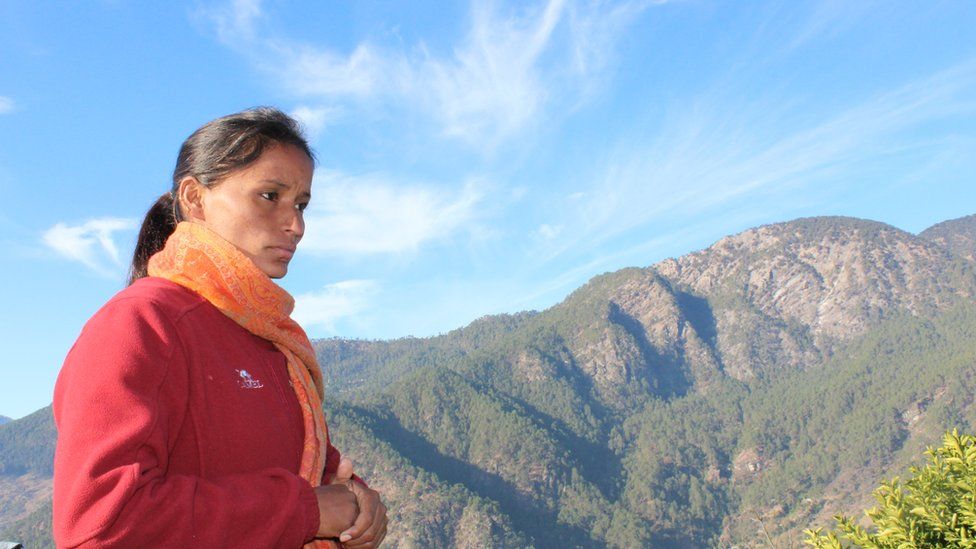The woman who braved Himalayan floods to rescue hundreds
- Published

Mamta Rawat, a 24-year-old woman, helped rescue hundreds of people from the 2013 floods in the north Indian state of Uttarakhand, where more than 5,000 people are presumed to have died. BBC Hindi's Salman Ravi met the young woman, who did not stop her rescue work despite losing her own home in the disaster.
Ms Rawat was at home in her village Bankholi, when she got a call on her mobile phone, saying that a group of school students trekking in the Himalayas were stranded amid torrential rains.
A professional mountain guide, Ms Rawat had grown up around the mountains and was familiar with the terrain.
Unsung Indians
This is the 13th article in a BBC series Unsung Indians, profiling people who are working to improve the lives of others.
More from the series:
She was able to reach the stranded group quickly and escort them back to safety.
However, by the time she returned, floods had begin to engulf the mountainous area and the distress calls were coming in thick and fast.
Braving the odds
Ms Rawat told the BBC that she was flooded with requests to rescue people trapped on various mountains, some 2,500 metres (7,500 feet) above sea level.
So that's exactly what she did, continuing to help people in need, despite the fact that her own home had been destroyed, and many of the bridges and roads in the mountains had been washed away.
Col Ajay Kothiyal, principal of the defence ministry-run Nehru Institute of Mountaineering (NIM), told the BBC that they had asked Ms Rawat to help with the rescue effort.
"Mamta even carried an old woman 3km (1.8 miles) up a mountain so that she could be evacuated by helicopter. She also helped construct a makeshift rope bridge to get stranded people cross a river," he said.
Ms Rawat, a school dropout, is the sole breadwinner of her six-member family.
A part-time trainer for the NIM, she supplements her income by working as a mountain guide for trekking groups.
"I don't make a lot of money, just barely enough to make ends meet. During climbing season, I manage to earn around 10,000 rupees (£100; $151) a month. But the rest of the year I find it difficult to even make 5,000 rupees," she told the BBC.
"Because we live in a mountain region, we don't have companies or other projects where people can work. Tourism is the only source of income, but after the 2013 floods, tourists stopped coming. Hopefully things will start changing now with the reconstruction work going on," she added.
Breaking stereotypes
Her choice of profession however, came with a lot of criticism, especially from members of her community who felt that a woman should not be doing a "man's job".
But not only was she undeterred by the mood, she now trains other young women to be mountain guides as well.
"Mamta's training has helped me get employment as a guide for trekking groups that come to Uttarkashi. She has helped me support a family of four as my parents are ill and my brother is unemployed," Sumila, who uses only one name, told the BBC.
Jaya Manju Ponwar also sees Ms Rawat as a role model.
"I completed my basic mountaineering course on Mamta's advice. I now accompany her when she guides trekking groups. I am learning a lot from her and that has given me confidence," she said.
But that is not the only change Ms Rawat is making in her community.
She is also helping villagers in the area develop local infrastructure to attract more tourists. Efforts include construction of traditional wooden houses and the championing of local cuisine.
At home though, she is being asked the question posed to most Indian women her age - what about marriage?
Ms Rawat says she has received many proposals, but is quick to add that she is not interested, since she feels her work for the community is more important.
"I am happy that all those who criticised me for going out to earn a living and doing a work that a man should do, now stand with me. They felt happy when my work was recognised by the newspapers in Uttarakhand. Everyone came and appreciated my work. Now they want their daughters to be like me," she says with a smile.
- Published17 April 2016